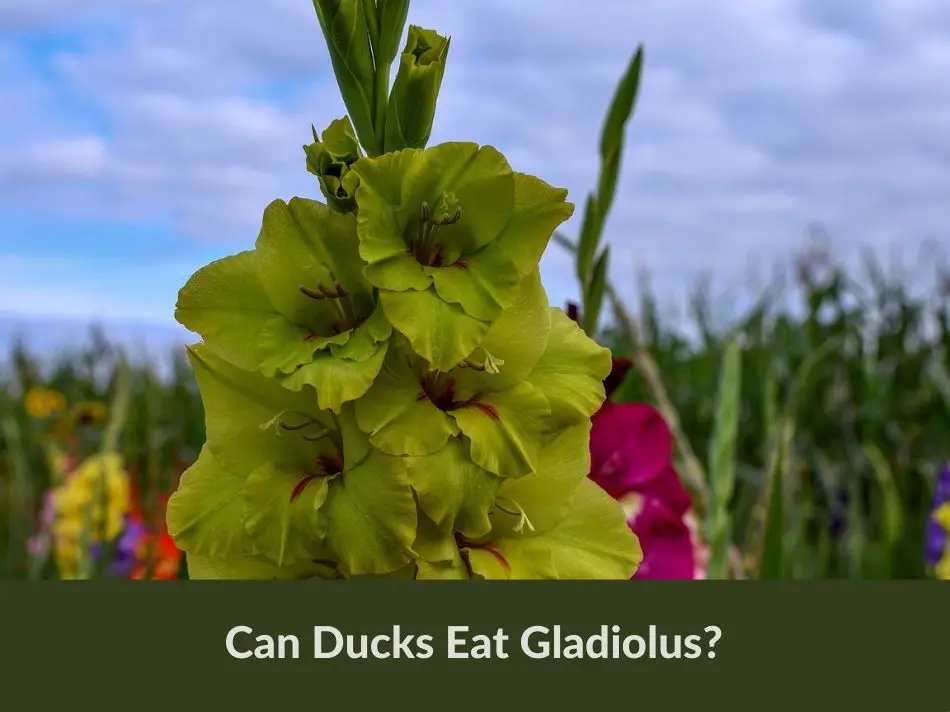Ducks are omnivorous birds with a diet that encompasses a wide variety of foods. In the wild, they feed on aquatic plants, seeds, small fish, insects, and crustaceans. Domestic ducks are often fed a balanced diet that includes commercial duck feed, which is formulated to provide all the necessary nutrients they require. But, can ducks eat Gladiolus?
No, ducks should not eat gladiolus. Gladiolus plants contain substances that can be toxic when ingested in large quantities. For ducks, the consumption of gladiolus, particularly the bulbs, can lead to digestive issues and potential toxicity.
In this article, we will explore the suitability of gladiolus as a food source for ducks. We will look into the general dietary requirements of ducks and whether they can safely consume gladiolus.
What Are Gladiolus Flowers?
Gladiolus flowers, often admired for their striking beauty and architectural form, are flowering plants belonging to the genus Gladiolus in the Iridaceae family. The name ‘Gladiolus’ is derived from Latin ‘gladius’, meaning sword, which aptly describes the sword-like appearance of its leaves. These perennial plants are known for their tall flower spikes and large, colorful blooms that range from pink, red, and purple to yellow, orange, and white.
The genus Gladiolus encompasses around 300 species, which vary widely in their habitat preferences and growth conditions. They are native to sub-Saharan Africa, with a particularly high diversity in South Africa, but have been extensively cultivated and naturalized in other parts of the world.
Gladiolus plants are cormous, meaning they grow from a bulb-like structure known as a corm, which stores energy over the winter. In temperate climates, these corms are often planted in the spring, so they can grow and flower in the summer. The plants are popular not only in gardens and landscaping for their aesthetic appeal but also as cut flowers due to their long vase life and dramatic presentation.
The flowers of the gladiolus are not only ornamental but have also been used in traditional medicine in some cultures, although their medicinal properties are not widely recognized in modern pharmacology. It is important to note that while gladiolus flowers are celebrated for their beauty, certain parts of the plant are known to contain toxic alkaloids, which can be harmful if ingested by humans or animals.
Are Gladiolus Flowers Toxic To Ducks?
The question of toxicity in plants is crucial when considering what to feed ducks. Gladiolus flowers, along with their bulbs, are indeed considered toxic to ducks and other animals when ingested in significant amounts.
The plant contains substances that can cause symptoms such as drooling, vomiting, lethargy, and in severe cases, can lead to liver and kidney damage. The bulbs contain the highest concentration of these toxic compounds and pose the greatest risk.
Other Flowers Ducks Can Eat
While gladiolus may not be on the menu for ducks, there are plenty of other flowers that can be safely offered to these feathered friends. Many common garden flowers are not only non-toxic but can also provide a source of vitamins and a change of pace for a duck’s diet.
Here’s 5 more flowers that ducks can eat:
Make sure to check out our full list of flowers and plants that ducks can eat.
Conclusion
In summary, gladiolus is not a suitable food for ducks due to its potential toxicity. Both caretakers and park visitors should refrain from feeding these flowers to ducks and ducklings.
There are many other healthy and safe food options available that can be offered to ducks. Always prioritize the health and safety of the birds when choosing snacks for them, and when in doubt, consult with a veterinarian or an avian specialist.
Disclaimer: The information in this article is for informational purposes only. I'm not an expert or a veterinarian.


